This book is an intellectual biography of that singular individual John Stuart Mill, son of James Mill and husband of Harriet Taylor, these two being the most important facts in his life. Hereinafter James Mill will be referred to as James Mill and John Stuart Mill as Mill. Got it?
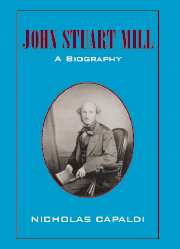
James Mill’s father, Mill’s grandfather, was a shoemaker in Scotland. James Mill was a bright lad and earned scholarship to finish a basic education and became ever after an autodidactic. The family was and remained irreligious and that barred James Mill and Mill from the clergy, the most learned of professions, as well as from the law and parliament, and also universities. A lawyer, a parliamentarian, and a university don, each had to accept publicly the thirty-nine orders of the Anglican Church and neither James Mill nor, later, Mill would do so in contravention of their own beliefs. For someone with intellectual interest and ambitions there was little other opportunity, but to work as a clerk. Since Ebenezer Scrooge was not hiring, James Mill found his way to the East India Company, which was a private corporation and did not require allegiance to the established Church.
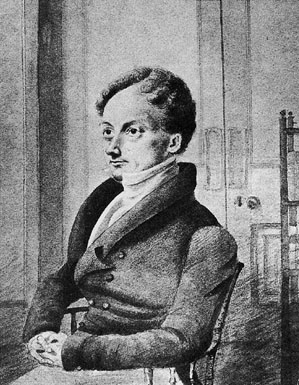 James Mill
James Mill
James Mill was a hyper-Calvinist in everything but theology. He was exacting and critical. He prospered at work, and educated all of nine children at home. His education of Mill at home is well known. It started at about age 3 by which time young Mill was reading Plato’s dialogues. It was a massive and unremitting program of force-feeding. Mill in turn was made to teach his siblings. The children seldom left the house and none had any friends. Mill does not mention his mother even once in his ‘Autobiography’ and James Mill treated her like a servant, said those who visited the house.
Mill was a child prodigy and completely inept social and physically. He had no friends and never played any games that boys played and so his motor skills were limited to shoe tying. The same is true of the other children but Mill is the focus here.
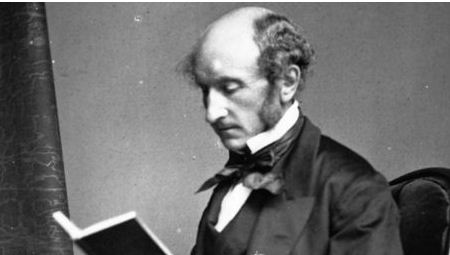 John Stuart Mill
John Stuart Mill
James Mill was an acolyte of Jeremy Bentham and together they sired utilitarianism as a social and moral school of thought. Bentham became a de facto godfather to Mill who in turn was the godfather of Bertrand Russell. Bentham discretely supported James Mill’s family, having made a pile of money by investing in a mill in Scotland. The milll was at New Lanark and run by Robert Owen, himself a social reformer of note.
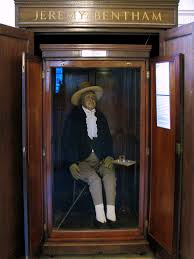 Jeremy Bentham
Jeremy Bentham
Bentham had a joie de vivre that James Mill lacked and Bentham in time revealed to young Mill something of the wider world of poetry, drama, literature, and walks in nature, and a visit to France which made the young Mill a Francophile. James Mill deferred to Bentham’s influence on his son, Mill, but turned each new interest into another assignment. A walk became an exercise in collecting, identifying, researching, and preserving botany samples. The visit to France with Bentham required Mill to learn French. To read Shakespeare became and exercise in the history of the English monarchy. James Mill drew a line at Shakespeare’s history plays. These Mill could read but not the tragedies or comedies. They might be a bad influence. See Plato on the dangers of poetry. James Mill made Mr. Gradgrind look like light relief. See Charles Dickens’s ‘Hard Times.’
I have long thought that Mill had the education of a Platonic philosopher-king. At first he learned by rote and repetition, seldom understanding what he read. His father was impossible to please and the slightest hesitation, not to say error, would mean the whole lesson had to be repeated from the beginning. Mill feared his father’s judgement. (Yes, James Mill was feared rather than loved but not hated.) One lifelong friend of James Mill said that he, James Mill, never praised anyone and criticised everyone immediately and often. When Mill taught his younger siblings, if one of them made a mistake, James Mill required Mill to repeated the lesson until all eight children were letter perfect. Their home schooling started each of seven days at 5 am and continued to 9 pm. James Mill conducted the hours 5am to 9 am and then went to work at the India House, returning for the testing session from 6pm-9pm. From 9 am to 6 pm Mill schooled his siblings. Such reinforcement as James Mill offered was always negative, though never corporeal.
James Mill educated his children at home because school education was too shallow and sloppy. His children seldom left the house. Likewise he saw no need for any of his children to go to a university. He particularly concentrated on Mill to make him the perfect and complete exposition of utilitarianism. James Mill created Mill so that he could go forth and reform the world in the image of Jeremy Bentham. Mill was an android artificially made for a mission. Indeed some of Mill’s peers in later life referred to him as the mechanical man. Mill’s upbringing differed from Plato’s philosopher-kings who were reared with others destined to be guardians and auxiliaries and even when crowned they did have annual sexual relations and common families, but Mill did not have any of that. They had social and sex lives, albeit constrained, that he did not have. A single purpose android is a more accurate description, like Mr Data without the tap dancing.
The software in the android became corrupted and Mill had a nervous breakdown when he was twenty (20). In his ‘Autobiography’ Mill blames this breakdown on the strain of his intellectual work. Capaldi, like just about everyone else, sees in it a suppressed rebellion against his domineering father. Mill did gradually recover his health and continued publicly to support his father in every way, but he began at this time to think for himself and gradually to step out of his father’s shadow in the safety of his own mind. After his father’s death Mill began to change utilitarianism, adopt liberalism, court Harriet, and more.
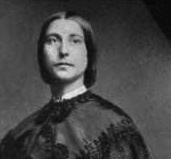 Harriet Taylor
Harriet Taylor
Mill’s long courtship of Harriet is well known. It was contentious and scandalous at the time. She was a married woman, and yet they were seen everywhere together, she clinging to his arm and he deferring to her, including at least one unchaperoned trip to France. Mr. Taylor was none too pleased about any of this. Given Mill’s repressed nature it is unlikely that Mill and Harriet had sexual relations, but by the standards of the day, that hardly mattered. He thought the world of her and extolled her qualities far beyond the mere mortal. When Taylor died that freed Harriet, divorce having been out of the question, the appearance of adultery was preferable, it seems.
They married almost immediately after Taylor’s death and had about ten years before she died. I had not realised it, but the three most famous of his works came after her death: ‘Utilitarianism,’ ‘On Liberty,’ and ‘Considerations on Representative Government.’ Mill thought of these essays as memorials to her. In all of these three, along with his earlier work, the underlying and unifying theme is autonomy, defined as the capacity, the ability, and the responsibility to decide for oneself. Achieving that was a moral goal for individuals and a determinant for public policy to create the conditions for individuals to develop the ability and capacity for autonomy through education, example, discipline, exposure, personal growth, and surrender to the larger whole. Insofar as democratic political institution encouraged and promoted autonomy he supported them though he had learned from Tocqueville to fear the tyranny of the majority (for a current example, watch 7MATE for one whole day).
Autonomy is not license or freedom, nor even liberty. Think of an orchestra. Now take away the conductor, the first violin and any other authority or leader. If the musicians are autonomous their own comprehension of the the needs of a given piece of music will lead them to participate, or sit it out, and to do it a certain way that blends them together into a whole. a if they had a conductor. If and when that happens, that is autonomy. By the way, there are leaderless orchestras that do not descend into the conflagration of the Fellini’s ‘Orchestra Rehearsal’ (1978). Another example that came to mind is the Gospel of Mathew that calls upon believers to decide for themselves, and in so doing their decision will coincide with the divine. Emmanuel Kant makes a powerful example from that gospel by urging the devout believer even to turn away from a risen Christ, and decide… In the telling most of the power is lost; read it in Kant.
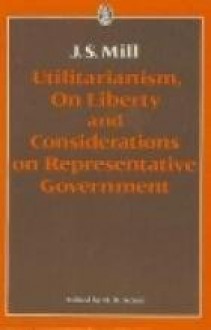
He also served one term in parliament where he was a formidable committee man, I believe, but none of his committee work is mentioned in these pages. I have read Hansard micro-cards that record of some of his testimony to parliamentary committees and interventions while on committees and found them to be trenchant. What I saw related to the Northcote and Trevelyan reforms of the civil service. In his parliamentary career Mill was usually on the side of the angels but not always. He argued and voted for the death penalty for murders.
Capaldi does a superb job analysing Mill’s many, many texts and shows Mill to be a far more complex thinker than revealed by the simple elegance of his own prose. Capaldi brings out well the the French and German influences on Mill. For the French there is Tocqueville, of course, but also Saint-Simon fils and Auguste Comte. For the Germans the romantic poets and even that dynamic duo of Kant and Hegel. In all, Capaldi goes a long way to establishing Mill as a figure who cannot be typecast. Was he a conservative? a liberal? a radical? a democrat? an elitist? a deontologist? a utilitarian? a positivist? an empiricist? The answer in each case is ‘yes’ but in his own special way. He was both a liberal and a conservative.
Mill had form. He was arrested for obscenity while a teenager. The crime, of which he was certainly guilty, was passing out pamphlets urging birth control.
Mill was a lifelong proponent of female suffrage. When he and Harriet married, they went to some pains to avoid the norm according to which he would have become the owner of all of her goods, including a considerable inheritance from Taylor.
Mill’s book ‘A System of Logic’ made his name in the first instance. It was so highly regarded that in addition to large sales, almost immediately, it also went on the curriculum at Oxford and Cambridge. In short order, his other books began to follow on to the curriculum, including ‘On Liberty’ and ‘Representative Government’ and they in turn could be best understand by reference to the previous thinkers he analysed and synthesised and so was born ‘Political Theory’ as a field of study in universities. Indeed his impact on the Oxbridge universities, where he never set foot, was so great that after his death, academic reputations were made by tarnishing his; the attack of the pygmies on the defenceless is always a sure sign of stature.
Because of the range of Mill’s works, after his death he was claimed as a precursor by a wide variety of causes from co-operatives, Fabian socialism, and the 800 Club. To his contemporaries Mill was an enigma: he did not fit into any of the categories available, and they knew it. It is still true that he is an odd man out but we generally no longer recognise that, and force him into one box or another, and then dismiss him. Our loss. Today he has largely been reduced to a stereotype no less distorted than that which applies to Machiavelli.
I would have liked a more clearly presented chronology, maybe as an appendix. I also found it hard to read, especially the extensive quotations from secondary sources and Mill’s own ‘Autobiography’ which interrupted any flow the text had. While the early chapters fill out Mill’s life well, that falls away in favour of ever finer-grained examination of his ideas, arguments, and publications, despite the subtitle: ‘A biography.’ I found almost nothing about his forty (40) years of work for the East India Company, though the author does suggest that his responsibilities were comparable to a cabinet minister. I stress this reference to India because the last pages of ‘Considerations on Representative Government’ say somethings about India that give one pause. Indeed the last lines refer to India as ‘semi-barbarous.’ His tenure with the East India Company included the Sepoy Rebellion, so it was not all business as usual.
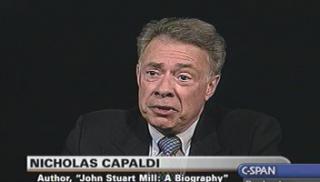 Nicholas Capaldi
Nicholas Capaldi
The wheel turns. James Mill and Mill did much to govern India from London and today India does the same for Britain through those call centres. In fact, there is so much demand for Indian call centres, I discovered, that Indian companies are sub-contracting many of them to the Philippines. I am pretty sure that recently when I called AusGrid to report a burned out street light outside our front door, the agent I spoke to was probably in India, the accent, the slight lag in voice transmission, the formality of word choice…maybe.
Skip to content
